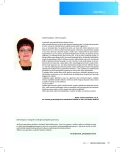-
Medical journals
- Career
Normotense hydrocephalus as a cause of deterioration of dementia in a geriatric patient
Authors: B. Kamburov; M. Nováková
Authors‘ workplace: Centrum následné péče 2. LF UK a FN Motol, Praha
Published in: Geriatrie a Gerontologie 2016, 5, č. 2: 70-74
Category: Review Article
Overview
Normotense hydrocephalus (NPH) can be one of the causes of rapid development of cognitive defect or sudden deterioration of geriatric patients’ pre-existing dementia. It is fairly easy to detect this condition through common imaging methods, especially by CT or MRI of the brain. The main issue however is that it is necessary to think of the possibility of such diagnosis in the first place.
In order to identify the correct diagnosis it is invaluable to obtain detailed anamnestic data from the patient’s carers or family. If the anamnesis includes information about rapid deterioration of the pre-existing dementia or fast onset of cognitive deficit, we should always consider NPH.
About half of the patients considerably benefit from inserting a VP shunt. After this therapeutic procedure is carried out, many patients show improvement of cognitive functions, ability to move and incontinence.
Those patients whose condition does not improve notably after the VP shunt is inserted very probably suffer from another type of dementia, most likely Biswanger disease [3].KEYWORDS:
normotense hydrocefalus – dementia – Hakim trias – Step test – lumbal puncture – lumbal infusion test – brain CT – VP shunt – anamnesis
Sources
1. Šroubek J. Normotenzní hydrocefalus. Practicus 7/2013; 7–10.
2. Vybíhal V. Normotenzní hydrocefalu. Neurologie pro praxi 2011; 12(6): 411–417.
3. Baštecký J. Gerontopsychiatrie. Grada-Avicenum 1994; 55, 254, 255.
Labels
Geriatrics General practitioner for adults Orthopaedic prosthetics
Article was published inGeriatrics and Gerontology

2016 Issue 2-
All articles in this issue
- Elderly patients with colon cancer: a medical oncologist’s perspective.
- Normotense hydrocephalus as a cause of deterioration of dementia in a geriatric patient
- Self-sufficiency and its evaluation in the context of our legislative and practice, especially in terms of care allowance assessment
- Geriatric patient in emergency department.
- Is it possible to provide integrated care in the Czech Republic? Findigns from long-term action research
- Aqua-aerobics in prevention of musculoskeletal system deterioration among elderly women
- Monitoring of influence of new cognitive training programs /COGNIPLUS/ on the level of some mental processes and on quality of life of elderly people (seniors) with a mild cognitive impairment.
- Geriatrics and Gerontology
- Journal archive
- Current issue
- Online only
- About the journal
Most read in this issue- Normotense hydrocephalus as a cause of deterioration of dementia in a geriatric patient
- Self-sufficiency and its evaluation in the context of our legislative and practice, especially in terms of care allowance assessment
- Geriatric patient in emergency department.
- Elderly patients with colon cancer: a medical oncologist’s perspective.
Login#ADS_BOTTOM_SCRIPTS#Forgotten passwordEnter the email address that you registered with. We will send you instructions on how to set a new password.
- Career

